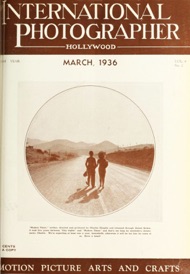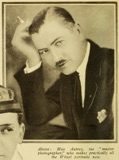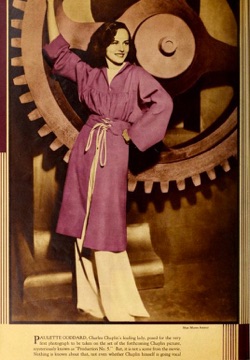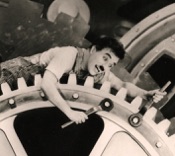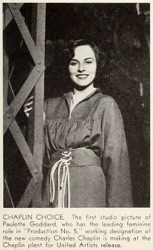Modern Times 1935 1936 1937 next previous
Modern Times Clippings 130/382
George Lewis, Los Angeles Eve.-Post Record, L. A., Cal., Jan. 30, 1935.
Max Autrey, the „master photographer,“ who makes
practically all the Witzel portraits now.
(...) Photo, Pictures and Picturegoer, London, England, Aug. 1925
& „Modern Times,“ written, directed and produced
by Charles Chaplin and released through United Artists. It took
five years between „City Lights“ and „Modern Times“
and that‘s too long by anybody‘s chronometer, Charlie. We‘re
expecting at least one a year, henceforth; otherwise
it will be too late for some of us. Have a heart!
(...) Modern Times Cover, International Photographer,
Hollywood, Cal., March 1936
& CONTENTS
Cover Still by Max Munn Autrey
(...) International Photographer, Hollywood, Cal., March 1936
& Rollie Totheroh has been chief of the camera
staff for Charles Chaplin since 1917 and was carried between
pictures by the comedian up to about five years ago.
(...) American Cinematographer, Hollywood, Cal., Feb. 1935
& PAULETTE GODDARD, Charles Chaplin‘s leading
lady, posed for the very first photograph to be taken on the set
of the forthcoming Chaplin picture, mysteriously known
as „Production No. 5.“ But, it is not a scene from the movie.
Nothing is known about that, not even whether Chaplin
himself is going vocal.
(...) Photo by Max Munn Autrey, Photoplay, Feb. 1935.
Max Munn Autrey is still photographer on Modern Times.
& Modern Times Scene, detail
& CHAPLIN CHOICE. The first studio picture of Paulette
Goddard, who has the leading feminine role in
„Production No. 5,“ working designation of the new comedy
Charles Chaplin is making at the Chaplin plant for
United Artists release.
(...) Photo, Motion Picture Herald, Feb. 2, 1935
& CHAPLIN TALKS
BUT MAY CUT IT
Monosyllables are Used Tentatively
in Sequences.
HOLLYWOOD, Calif., Jan. 2. – The matter of Chaplin‘s
talking into the microphone has been settled. But
whether his voice will issue from the sound horns behind
the screen is something else. (...)
By hint it is learned from Charlie‘s friend and business
manager, Alf Reeves, that at least three sound
sequences have been made. But they are only incidental
and could as well be left out, so far as the plot is
concerned. And moreover, Chaplin‘s initial utterances
for the sound track are wholly monosyllable.
(...) South Bend Tribune, South Bend, Indiana, Jan. 2, 1935
„It‘s about the troubles of a little man in an industrial world“
Editorial content. „cine matters
By George Lewis
A good many people we know who like to argue about
who‘s a genius these days, usually decide Charlie Chaplin‘s the
only one the screen ever had.“ (...)
* * *
„Monumental Work“ (...)
„However, it‘s about the troubles of a little man in an industrial world, and a small part of it in talkie form.“ (...)
Redaktioneller Inhalt
Modern Times 1935 1936 1937 next previous



